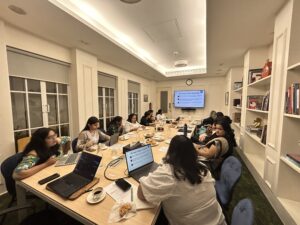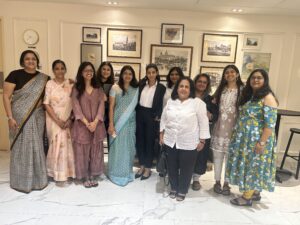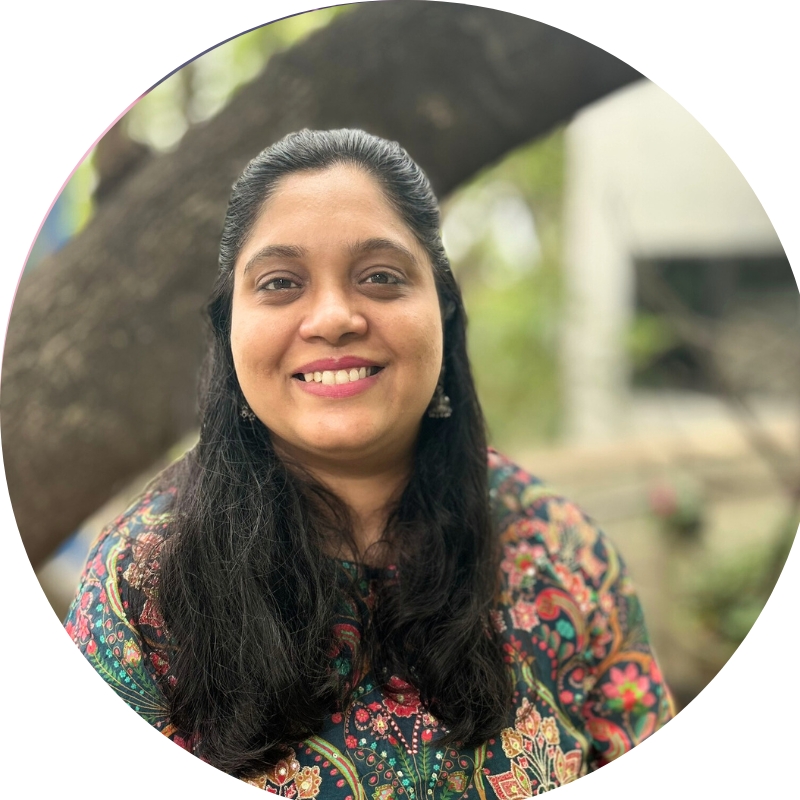
On December 10th, the Centre for Law and Policy Research convened a Roundtable Consultation in Mumbai with women lawyers from the Aurangabad, Bombay, and Nagpur benches of the Bombay High Court. The Roundtable was part of the CLPR’s larger ‘Women in Leadership’ initiative that seeks to address the gender gap in the higher judiciary. The consultation brought together eight women lawyers, including senior advocates, government pleaders and independent practitioners, to discuss the systemic and institutional barriers that impede women’s leadership positions in the legal profession.
Disha Chaudhari (Senior Research Associate, CLPR) opened the session by presenting an overview of the ongoing research on gender disparity in the judiciary. Nithya Rajshekhar (Senior Research Associate, CLPR) shared key findings from CLPR research data and reflected on the experiences of senior women lawyers and retired female judges. These revealed increased scrutiny of women candidates, opaque appointment processes, shorter tenures, and a lack of institutional support as core challenges. A live survey conducted during the session further underscored pressing issues such as caregiving responsibilities, discrimination, gender bias and sexual harassment in the legal profession.
In a moderated discussion, the Roundtable participants discussed the key barriers and the necessary institutional changes required to create a more gender-inclusive judiciary and proposed several actionable steps:
Reforms in Judicial Appointments
To ensure more women advocates are elevated to the Bench, the roundtable proposed that:
- Introduction of a transparent and equitable selection process for judicial appointments, similar to the senior counsel designation.
- Relaxations in the criteria or standards required for appointment of women judges should be considered to help create a more inclusive environment.
- Reserve judicial positions for domain experts among women lawyers, especially those from law firms who possess deep expertise in specific legal fields.
Professional Development Opportunities for Women Lawyers
- There should be institutionalized mentorship and fellowship opportunities for women, especially women lawyers from marginalized background that provides them the necessary professional and financial support to sustain and thrive in the profession.
- Women Lawyers should be paid fees equally as that of male lawyers.
- Ease eligibility criteria and mentorship programs that disproportionately disadvantage women, particularly those returning from maternity leave or career breaks.
- Expanding access to legal aid matters for women lawyers and adjusting fee structures accordingly to incentivise participation.
- Reserving key legal positions (AGPs, APPs, AAGs, and AGs) for women lawyers.
- Promote the visibility of women lawyers’ achievements through media outreach, curated lists and awards.
Leveraging Bar Associations as Key Stakeholders
- Modify eligibility criteria for contesting bar elections to mandate that candidates demonstrate mentorship of women lawyers.
- Mandate 30% reservation for women in Bar Associations.
- Women Lawyers Associations must be consulted and given a voice in the process of recommending names for elevation to the bench, and for senior designations.
- Bar Associations must take proactive measures like utilizing funds providing maternity leave benefits, waiver of library fees when on maternity leave and there should be women lawyers in decision-making positions in Bar Associations.
- Collective Action: Form a women lawyers’ association to advocate policy reform, mentorship, and increased professional visibility.
- Create dedicated POSH (Prevention of Sexual Harassment) Committees within Bar Councils and Associations.

Conclusion and Way Forward
The Bombay Roundtable addressed the gender gap in the higher judiciary and provided a crucial platform to identify systemic reforms and actionable institutional reforms such as collective visibility, institutional accountability and sustained mentorship. As with the larger ‘Women in Leadership’ initiative, the roundtable called to action and build a judiciary that is reflective of the diversity and expertise that women lawyers across regions and backgrounds bring to the table. Participants committed to further the recommendation through continued engagement with bar councils, state institutions and the judiciary.

